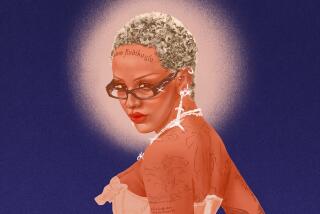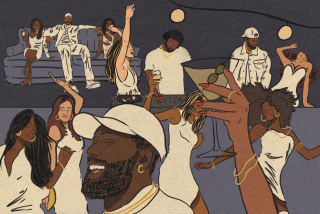More Magazines Jostling to Cover Lucrative Hip-Hop Beat
- Share via
NEW YORK — As the rest of the pop universe becomes increasingly fragmented and sales of rock albums prove disappointing, hip-hop’s numbers continue to soar. Hip-hop has elbowed its way into the mainstream, and evidence of this is everywhere: in the movies, in fashion and on television, particularly on MTV. The genre continues to influence other music styles, from R&B; and rap/metal hybrids to reggae dance-hall and the various styles of electronic dance music that rely heavily on sampling and other studio tricks.
“Hip-hop,” notes Jesse Washington, editor of Blaze magazine, “has got pop culture on lock.”
Stacks of money are to be made from this pop culture juggernaut, so it’s no surprise that the hip-hop magazine market is getting kind of crowded.
The Source, which was started a little more than 10 years ago by David Mays, continues its reign as the best-selling hip-hop periodical. It began as a free newsletter mailed to a thousand hip-hop heads; now, according to Mays, it boasts a paid circulation of 425,000.
Other players in the field include XXL (“double X L”), put out by Harris Publishing, which initially brought in Source co-founder James Bernard and former Source editor Reginald Dennis. (They both left after a dispute with Mays; now neither remains at XXL, either.) There’s Rap Pages, published by Larry Flynt, as well as Stress and Rap Sheet. And, of course, there’s Vibe, which doesn’t focus solely on hip-hop, but on a wider range of black music styles and urban culture.
Until Blaze’s arrival, the Source’s most formidable competition was Vibe, which was started by Quincy Jones and Time Inc. Ventures a little more than five years ago. Now with Blaze, which launched at 250,000 copies, Mays faces more direct competition. Blaze is the product of Vibe/Spin Ventures, a partnership whose members include Jones and Keith Clinkscales and whose empire includes Vibe and Spin (acquired last year).
When it comes to boasting--and dogging the competition--people who run hip-hop magazines seem to emulate the stars they write about.
Washington says that the Source lacks integrity because as publisher, Mays plays a role in editorial decisions; Washington describes himself as independent of commercial considerations. Mays dismisses the criticism as “ridiculous.”
Mays suggests that Washington is angering rap artists because he and his staff lack hip-hop backgrounds. “They’re not really all that familiar with or comfortable in the hip-hop world,” he says.
And yet the Source has had its share of run-ins with hip-hop artists. In 1994, Source freelancer Cheo Coker was punched by the Wu-Tang Clan’s Master Killa, who later apologized. That same year, the video for Public Enemy’s “I Stand Accused” depicted the group’s security trashing the offices of a rap magazine named “The Sauce.” Cypress Hill has burned copies of the Source onstage, and Mays concedes that various rappers have chanted “[expletive] the Source” during live shows.
But Mays strives to distance his magazine from these events. “We don’t drive people to the point where they feel like they have to use violence to get a message across to us,” he says.
Few will deny such posturing is more common in hip-hop. “The threat of this violence has always existed,” says Allen Gordon, the 27-year-old executive editor of Rap Pages and a former Source staffer. “There are a lot of the guys in this industry who allow certain street attitudes and ethics to enter the music business.”
If hip-hop journalists pal around with the music’s celebrities, says Gordon, “they lose that respect thing. Then there’s this male alpha-male thing. If you give in to extortion, pressure or a threat of violence by covering something or doing someone’s bidding, you get perceived as weak.”
More to Read
The biggest entertainment stories
Get our big stories about Hollywood, film, television, music, arts, culture and more right in your inbox as soon as they publish.
You may occasionally receive promotional content from the Los Angeles Times.










